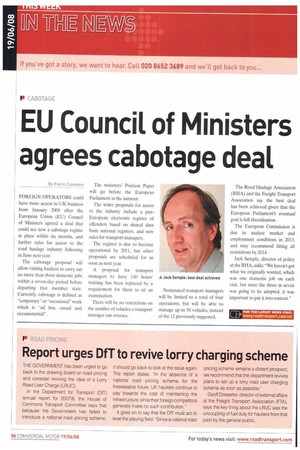EU Council of Ministers agrees cabotage deal
Page 6

If you've noticed an error in this article please click here to report it so we can fix it.
By Patric Cunnane
FOREIGN OPERATORS could have more access to UK business from January 2009 after the European Union (EU) Council of Ministers agreed a deal that could see new a cabotage regime in place within six months, and further rules for access to the road haulage industry following in June next year.
The cabotage proposal will allow visiting hauliers to carry out no more than three domestic jobs within a seven-day period before departing that member state. Currently, cabotage is defined as "temporary" or "occasional" work which is "ad hoc, casual and circumstantial". The ministers' Position Paper will go before the European Parliament in the autumn.
The wider proposals for access to the industry include a panEuropean electronic register of offenders based on shared data from national registers. and new rules for transport managers.
The register is due to become operational by 2011, but other proposals are scheduled for as soon as next year.
A proposal for transport managers to have 140 hours' training has been replaced by a requirement for them to sit an examination.
There will be no restrictions on the number of vehicles a transport manager can oversee. Nominated transport managers will be limited to a total of four operations, but will be able to manage up to 50 vehicles, instead of the 12 previously suggested. The Road Haulage Association (RHA) and the Freight Transport Association say the best deal has been achieved given that the European Parliament's eventual goal is full liberalisation.
The European Commission is due to analyse market and employment conditions in 2013, and may recommend lifting all restrictions by 2014.
Jack Semple, director of policy at the RI-LA, adds: "We haven't got what we originally wanted, which was one domestic job on each visit, but since the three in seven was going to be adopted, it was important to put it into context."
FOR THE LATEST NEWS VISIT: I
















































































































































































































